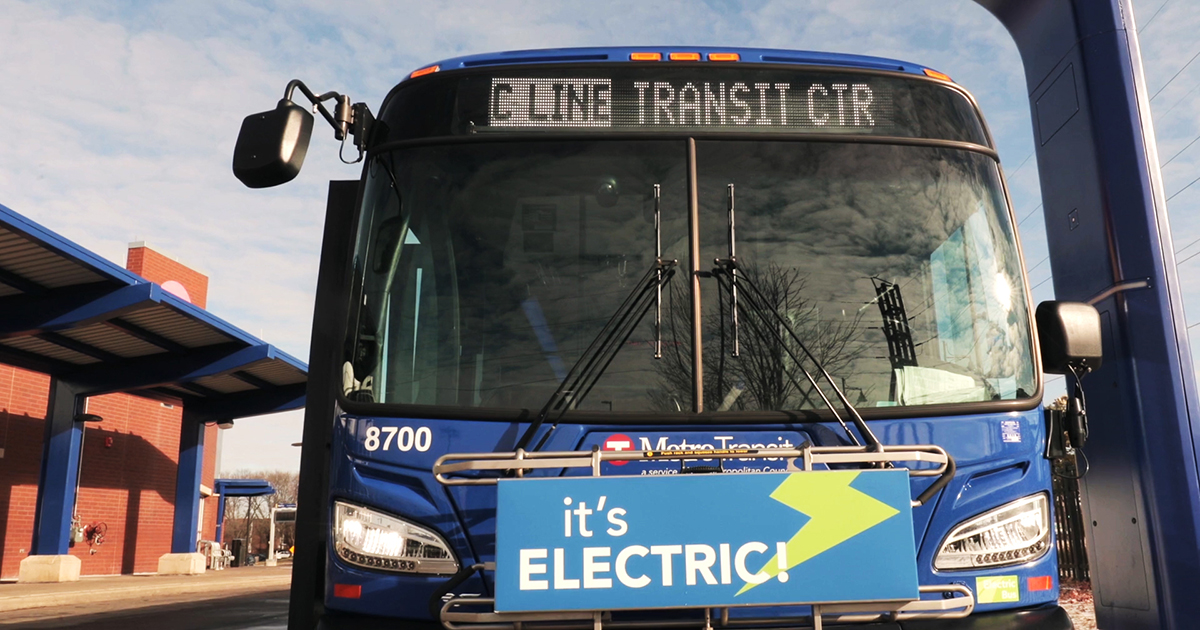Charging Up Investments in Cleaner Transit
Taking public transit is always more sustainable than driving alone, but using electric, zero-emissions buses does even more to reduce air pollution and advance health equity. For years, Move Minnesota has been advocating for fast, frequent, and pollution-free transit, especially in areas that have been disproportionately impacted by environmental hazards, like diesel emissions. So when the C Line opened in 2019, we were excited, not only for the 10-minute headways and comfortable stations, but also for Metro Transit’s commitment to pilot electric bus service on the route.
Now, thanks to federal funding and advocacy from a broad coalition of organizations, Metro Transit has an additional $20 million to grow the fleet of electric buses on the C Line and beyond.
So where did the money come from? In June 2023, Metro Transit received a Low Emissions or No Emissions grant from the Federal Transit Administration. But, to secure the $17.4 million, the agency needed to find a $2.4 million local match. In November, Metro Transit got that money from the Minnesota Department of Transportation—through a new fund established during the historic 2023 legislative session.
One of the many landmark accomplishments, the Minnesota Legislature directed more than $216 million in general funds to the Infrastructure Investment and Jobs Act (IIJA) Discretionary Match Program in 2023. Administered by MnDOT, this funding is available for transportation projects that have received a federal award and advance the purposes of the IIJA — the federal law signed in 2021 that authorized $1.2 trillion for transportation and infrastructure spending on “new” investments and programs.
Minnesota is expected to get a $7.4 billion piece of that funding over five years and, in 2022 and 2023, put $45 million toward bus electrification. For instance, Southwest Transit, which serves suburban cities in the West metro, recently received $8.1 million in IIJA funding to purchase four electric commuter buses — the first electric coach buses to operate in a consistent subzero environment in North America.
Across Minnesota, the transition to a carbon-free, emissions-free transit system benefits all of us, but is truly critical in communities of color and low-wealth communities, where people are disproportionately breathing dirty air and getting sick as a result. For instance, the North Minneapolis 55411 and 55412 area codes—served by the C Line—have the highest hospitalization rates in the Twin Cities for respiratory-related illnesses according to a 2014 University of Minnesota study.
But thanks to investments from programs like the IIJA, residents are getting a breath of fresh air.
In a report presented to the Metropolitan Council and a community listening session this summer, Metro Transit shared that the battery electric bus fleet drove a total of approximately 117,400 miles in 2023 alone—or 559,600 miles since electric buses hit the road in 2019. Even with a small pilot, these clean buses have already reduced the system’s climate emissions by 430 metric tons. That’s equivalent to powering 85 homes for a year or eliminating the use of 42,200 gallons of diesel fuel!
And this is just the beginning. In 2023, Metro Transit had, on average, four fully electric buses on the road. But thanks to these new investments from federal and state funding sources, the agency was able to purchase five battery electric buses and four chargers that will serve the Gold Line project beginning in 2025. It also purchased 20 more battery electric buses and 22 chargers to be deployed across local service routes in 2026.
Minnesotans can also look forward to growing fleets of electric school buses — and fewer students suffering from respiratory issues that impact their classroom learning and quality of life. In 2023, Minnesota was awarded 67 electric school buses from the federal Clean School Bus Rebate Program, and the state legislature appropriated $13 million to a program that provides grants to school districts to accelerate the deployment of electric school buses and use vehicle electrification as a teaching tool. In 2024, another 15 school districts across Minnesota — from Lanesboro to Saint Paul to Crosby-Ironton — got awards from the federal rebate program.
This progress is the result of years of advocacy from transit riders, elected champions, and allied organizations who have fought for funding and policy changes to shift from diesel to electric buses. Moving forward, we’ll continue to engage with the agency and elected leaders to make sure everyone has access to great bus service and clean, healthy air!

